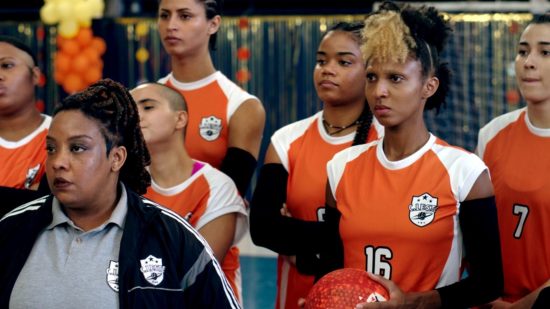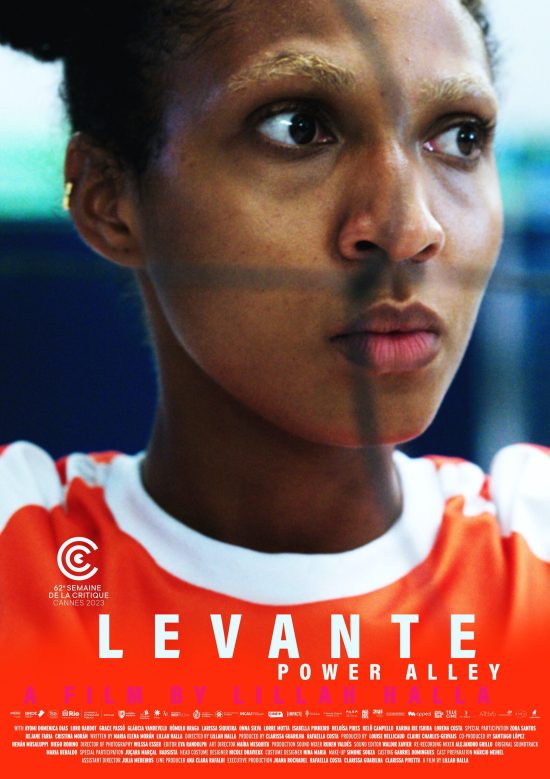LFF 2023 Review: Power Alley (Levante) – “The film is a rallying call for bodily autonomy and queer sisterhood”
Intersectional feminist solidarity fights back hard against religious conservatism in this confronting debut feature by Brazilian director Lillah Halla. The Portuguese title is Levante, which means get up, and the film is a rallying call for bodily autonomy and queer sisterhood. For seventeen-year-old Sofia (Ayomi Domenica Dias) and her friends, youth volleyball is more than a sport. Run by passionate coach Sol (Grace Passô), the team is a progressive community that includes trans and non-binary players. They’re a tight group and everyone has each other’s backs on and off the court. Their post-match celebrations are an explosion of queer joy and feminist energy, especially when they learn that star player Sofia is on a path to a scholarship in Chile.
But Sofia’s excitement is cut short when she discovers that she’s pregnant, by a man she refers to simply as “motorcycle dude”. She confides in new girlfriend Bel (Loro Bardot), who tries to comfort her, but Sofia is desperate to get an abortion. They both know the risks, getting an abortion is incredibly hard and dangerous for women who don’t have much money. Bolsonarism casts a long shadow outside of the safety of the Capão Leste changing room. Although other Latin American countries including Columbia and Argentina have repealed their anti-abortion laws in recent years, it’s still a crime in Brazil, one that carries prison sentences of up to three years. The only exceptions are for rape or incest, risk to a woman’s life, or birth defect that would mean the baby wouldn’t survive.
Although these laws pre-date the far-right former president, getting an abortion became even harder when he came to power, bolstered by support from evangelical Christians. Like many Brazilian cities, the suburbs of São Paulo are heavily divided over political and religious lines, as graffiti-filled walls remind us. It’s this division that drives the main plot. Panicked, Sofia looks up how to get an abortion in Brazil, leading her to a private clinic, claiming to offer her what she needs. It turns out to be a fake abortion clinic, where the staff go through her things and probe her about where the father is. Race and class intersect in Power Alley too, Sofia is working class and has mixed Afro-Brazilian and Uruguayan heritage, which makes her situation even more precarious. The clinic is run by white right-wing Christians who threaten young women into keeping their babies.
Sofia’s teammates quickly rally round, planning ways to raise money to help her, but she’s running out of options and time. Reluctantly, she tells her gentle, beekeeper father (bees and honey are recurring visual motifs) that she’s pregnant and needs an abortion. Her mother is dead and she’s an only child, so he’s her only hope. Sofia knows that she can access safe, legal abortion across the border in Uruguay, but he doesn’t agree with her decision. A conversation with a family friend convinces him to take the risk and make the long drive. In Uruguay, Sofia is treated with kindness and told she has the right to want a termination, but there is more bad news in store. She was born in Uruguay but doesn’t have the paperwork to prove it and can’t establish residency in time. By the time they get back, news of Sofia’s pregnancy has spread around the neighbourhood, thanks to the dog whistle from the woman from the clinic who instigates intimidation tactics against them.
The film can be a little didactic and exposition-heavy in places, and the subject matter leaves little room for character development, apart from Sofia. But this choice might be more for the benefit of non-Brazilian audiences, in a similar way that Eliza Hittman’s Never Rarely Sometimes Always explored US-specific reproductive rights. The third act verges on melodrama, but Halla’s point is made clearly. Power Alley’s greatest strength is in the casting. It’s a superb central performance by Ayomi Domenica Dias and some of the best scenes are when she’s surrounded by her squad. Underpinned by a rousing electronic soundtrack — the film is at its best when the group comes together to play, laugh, love and resist.











